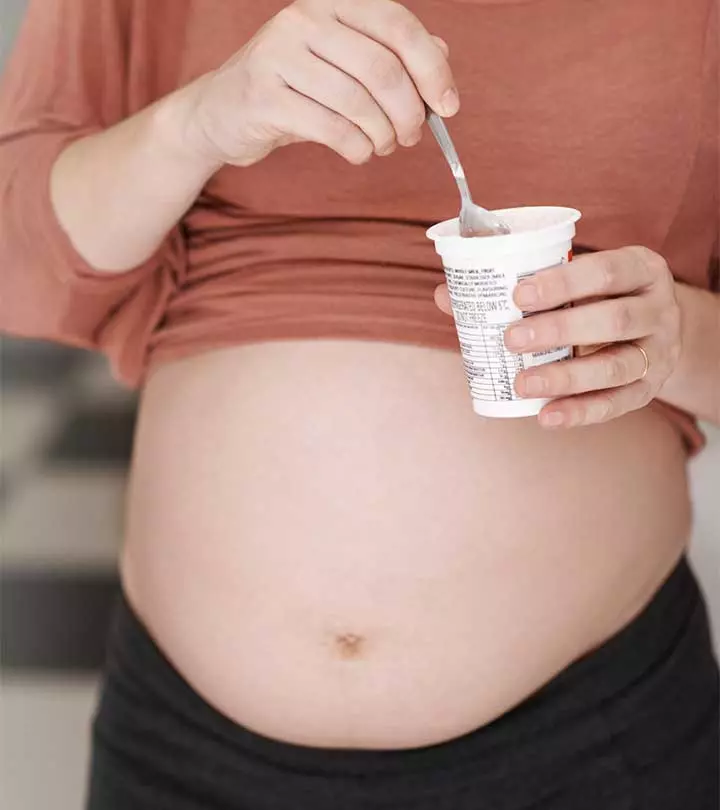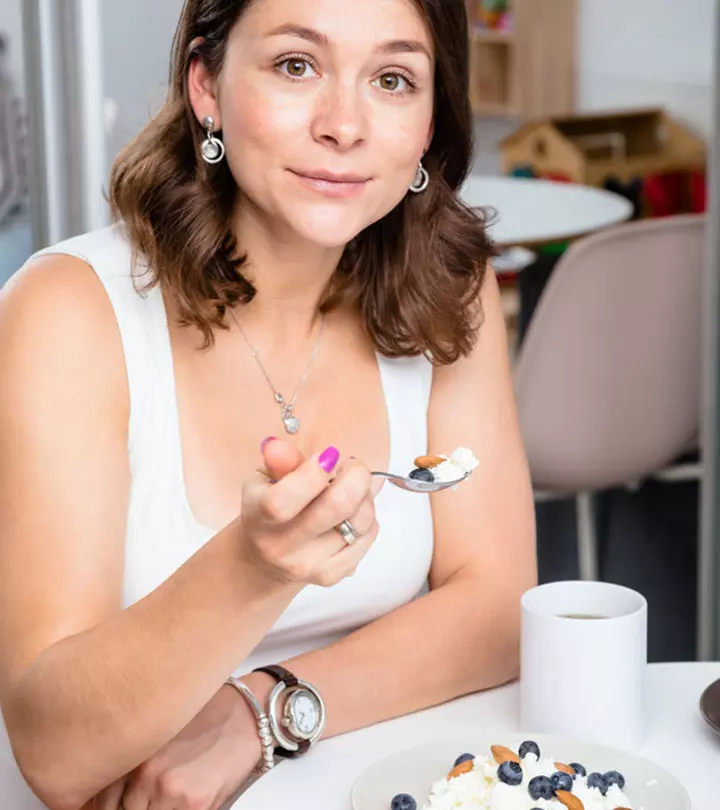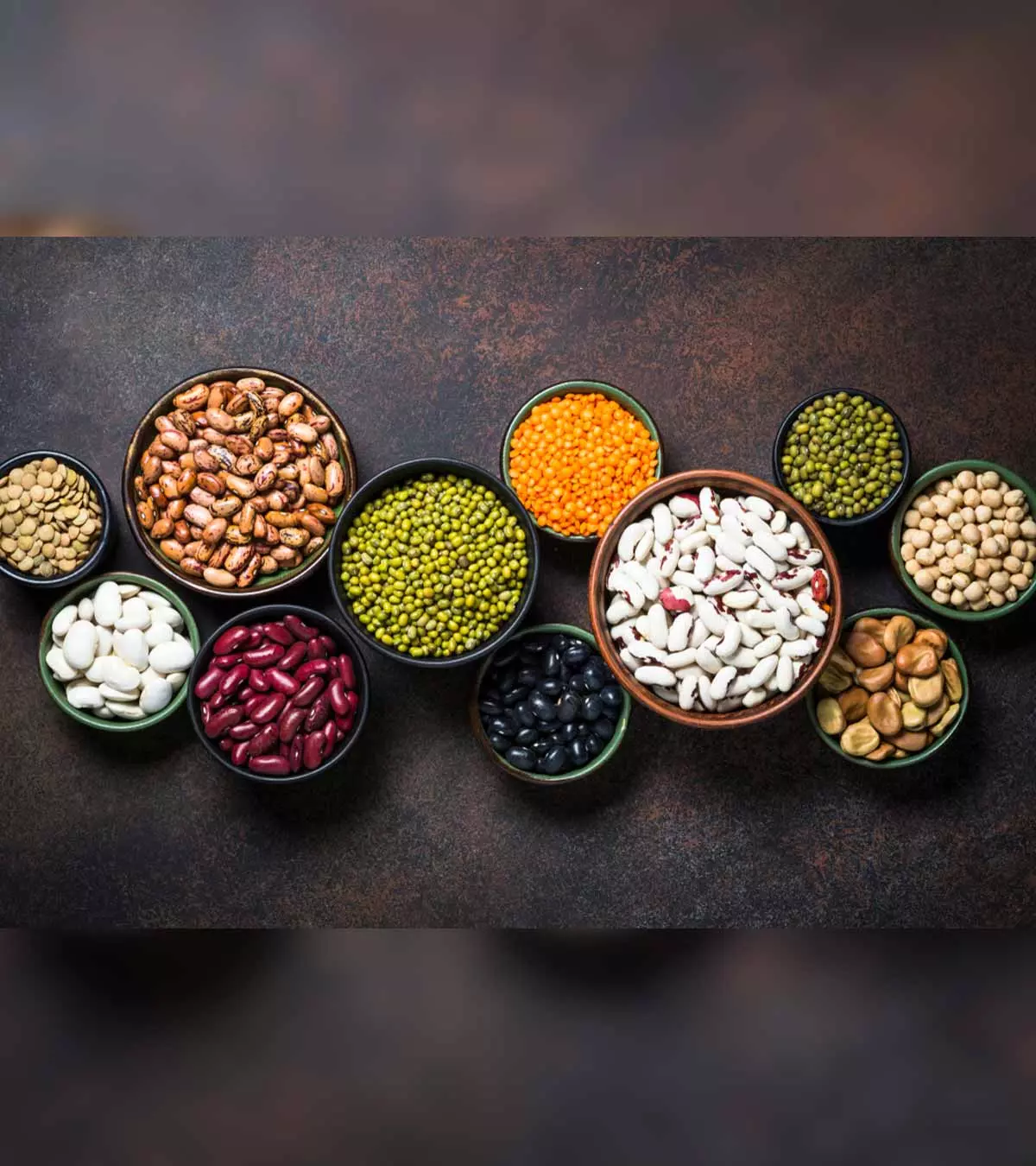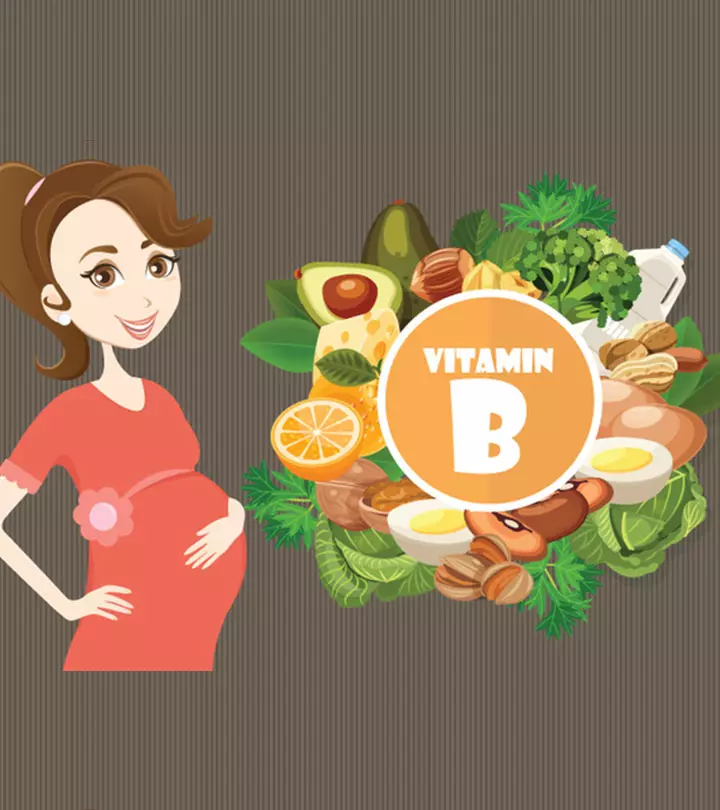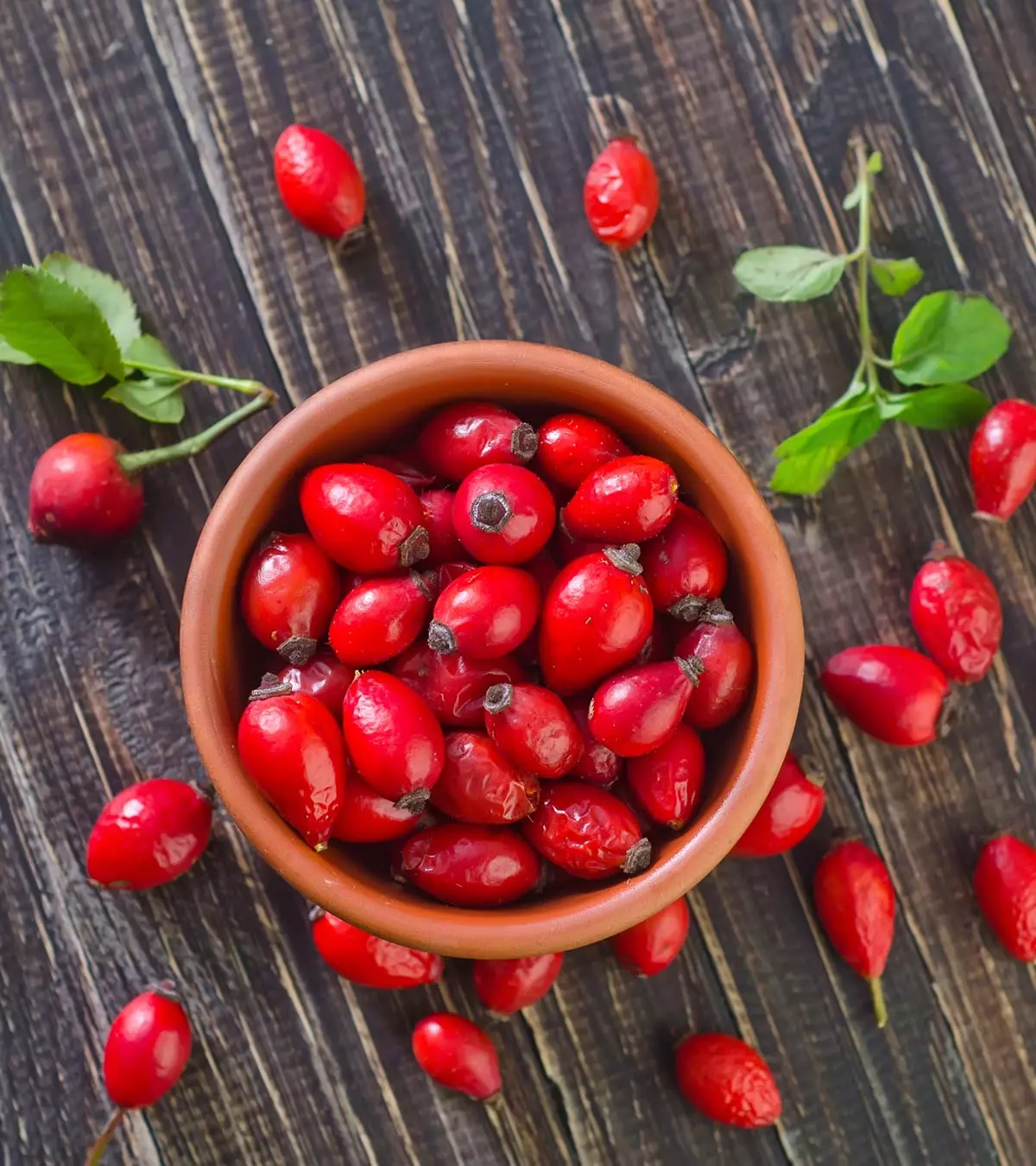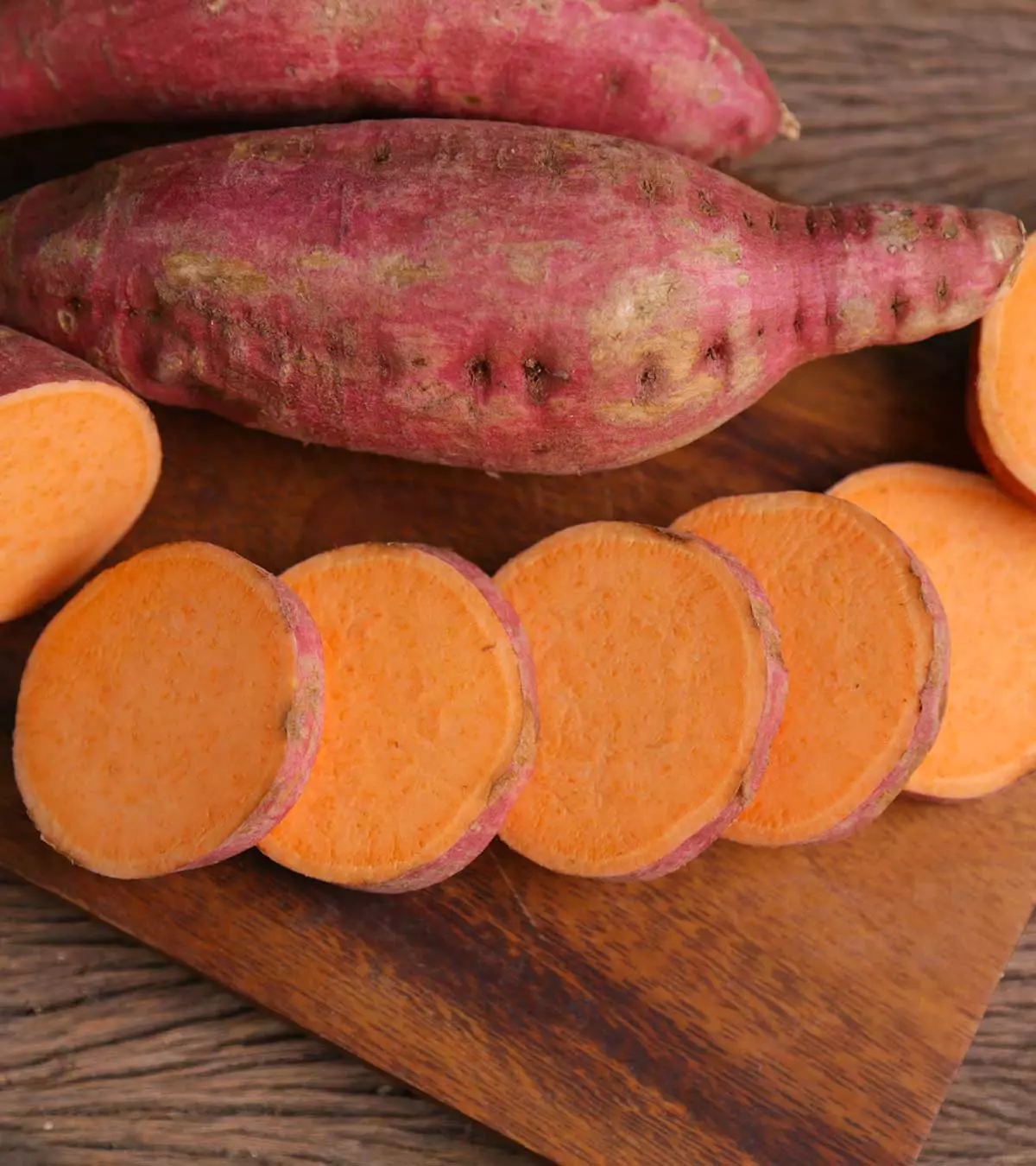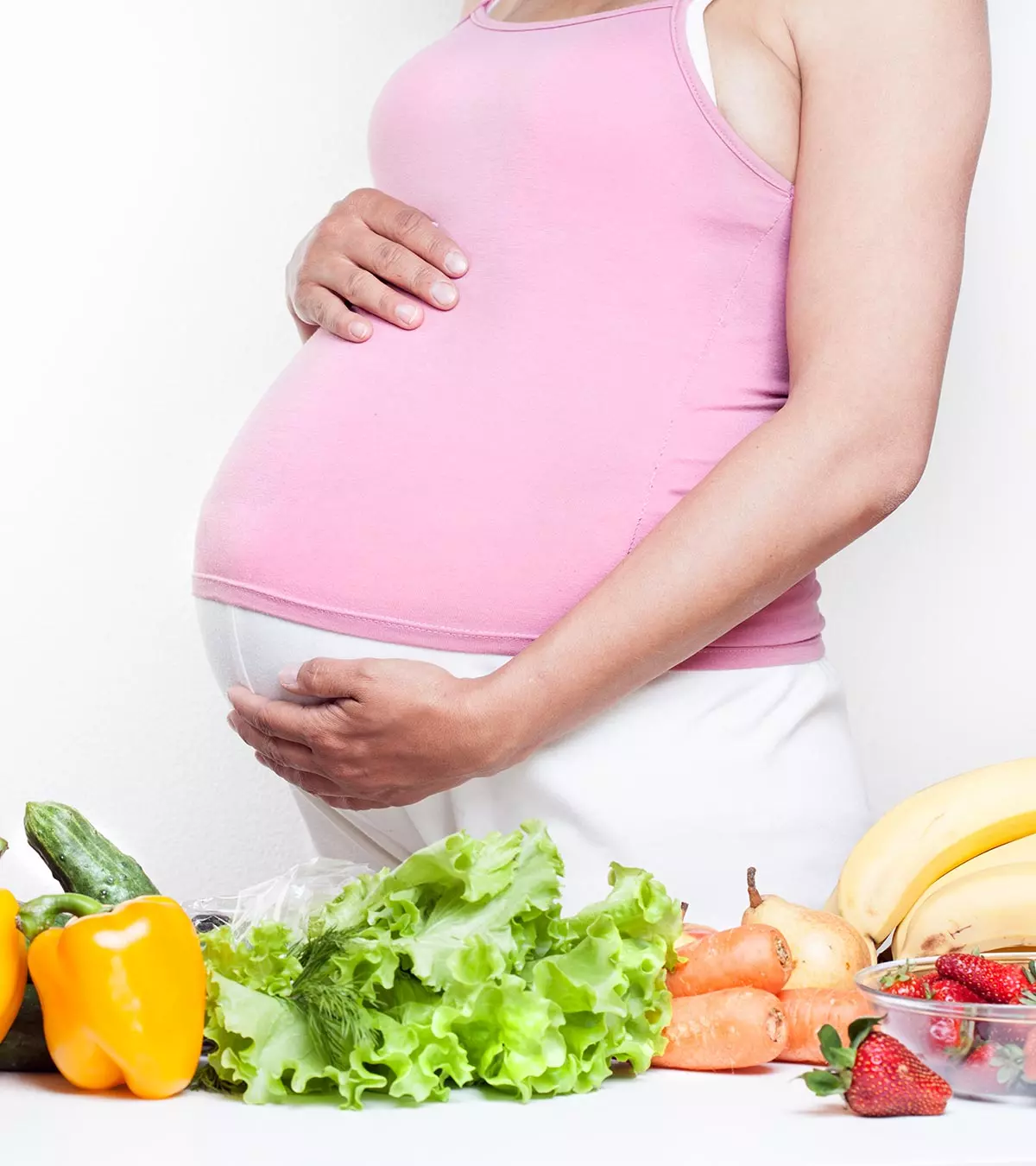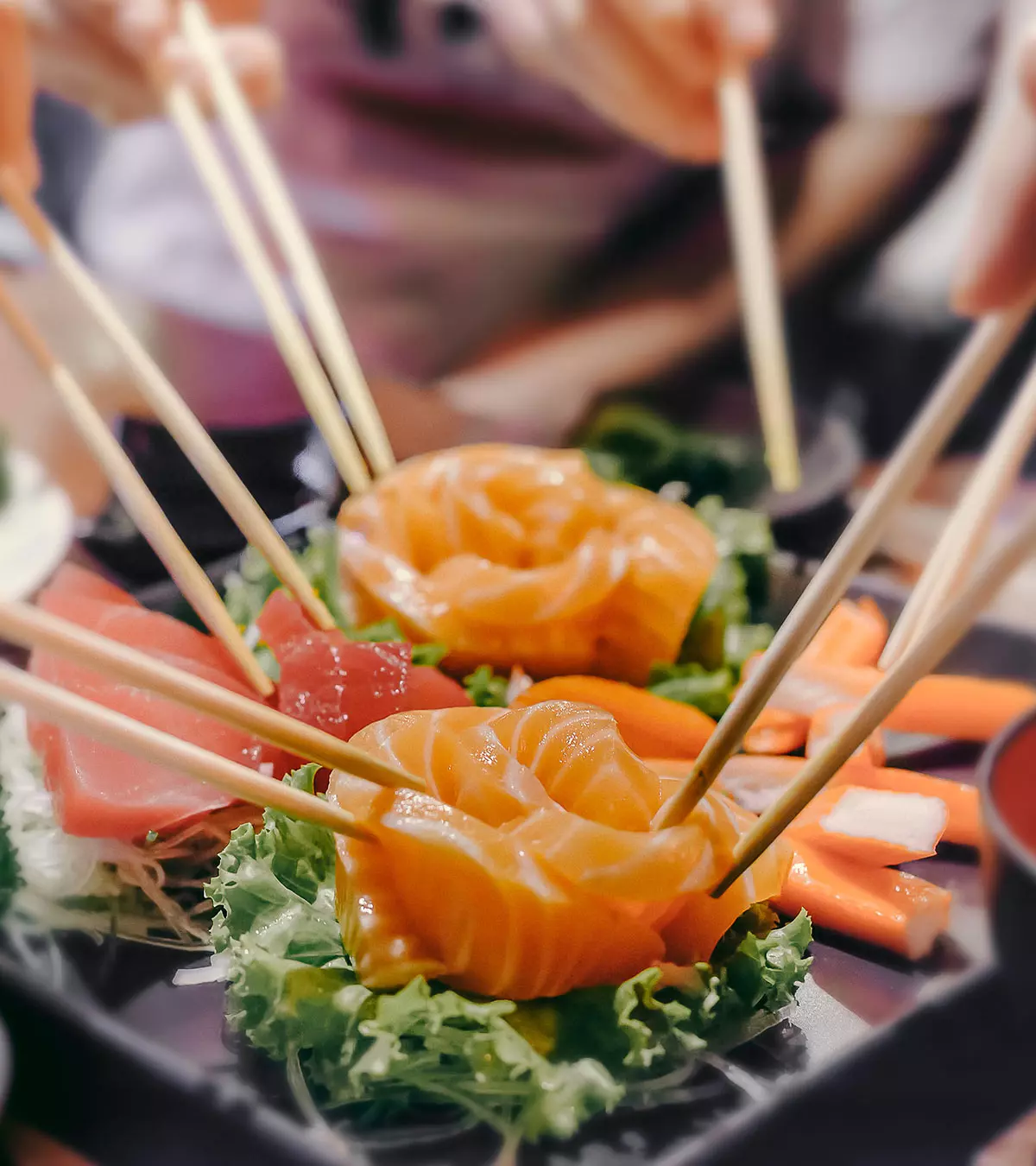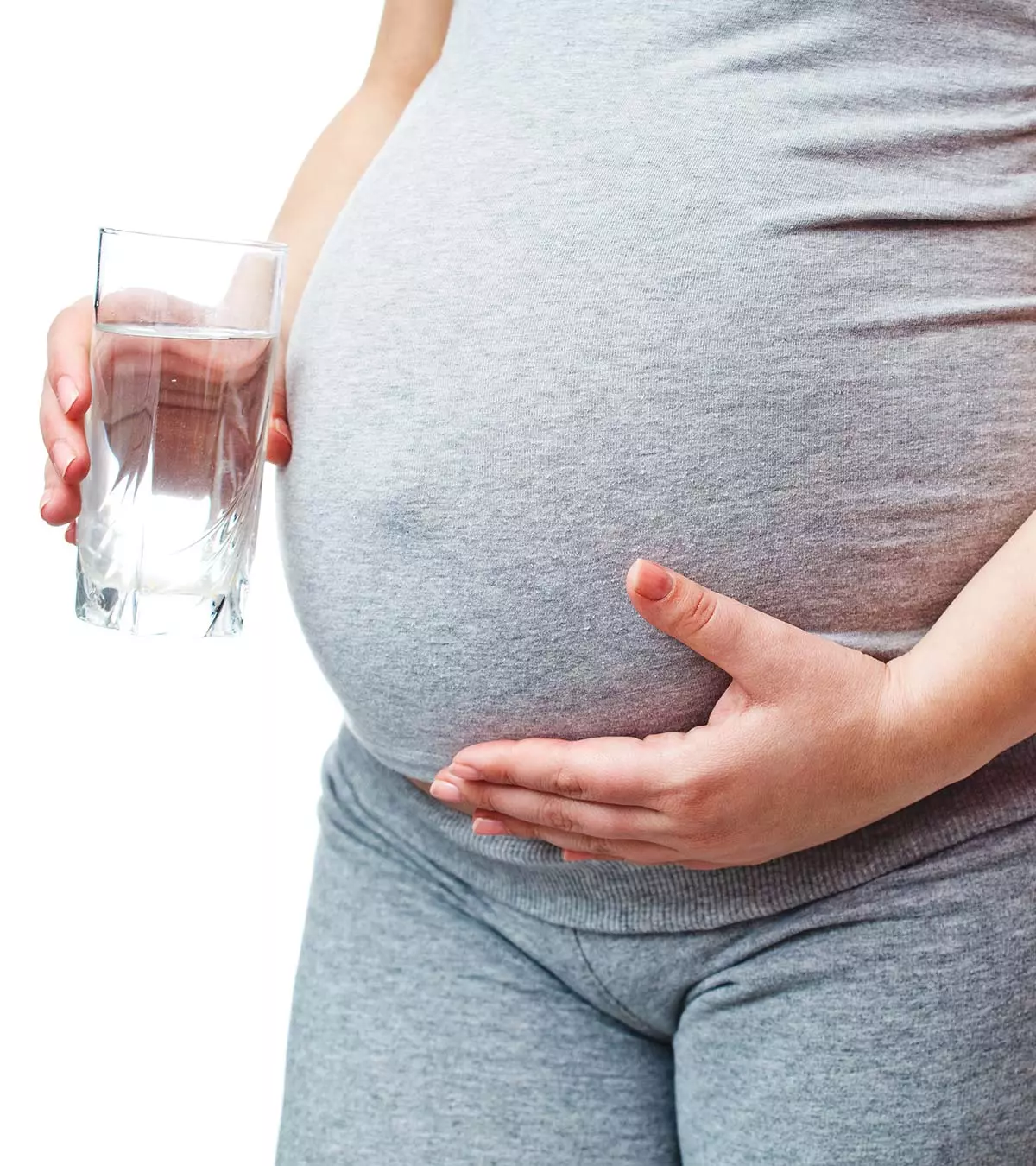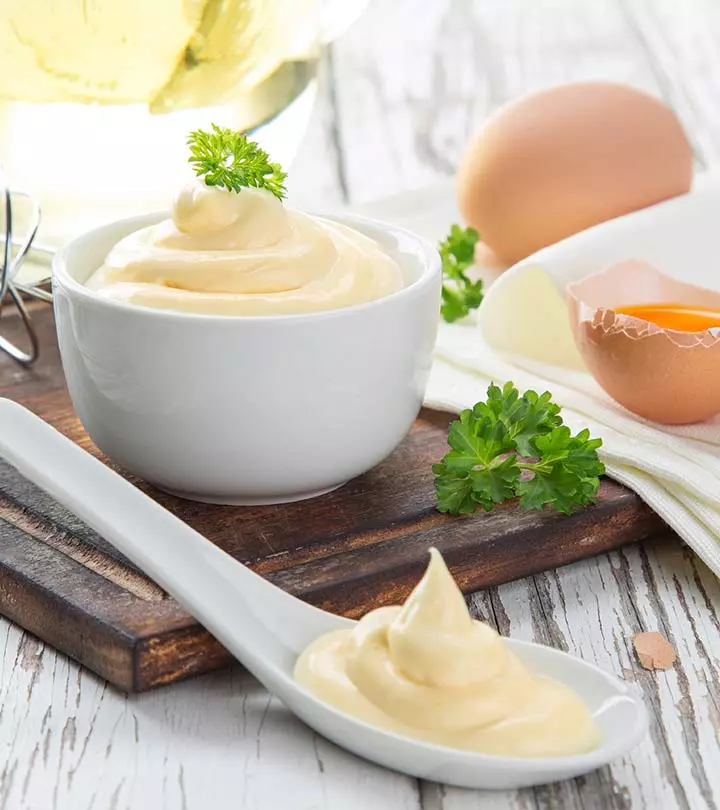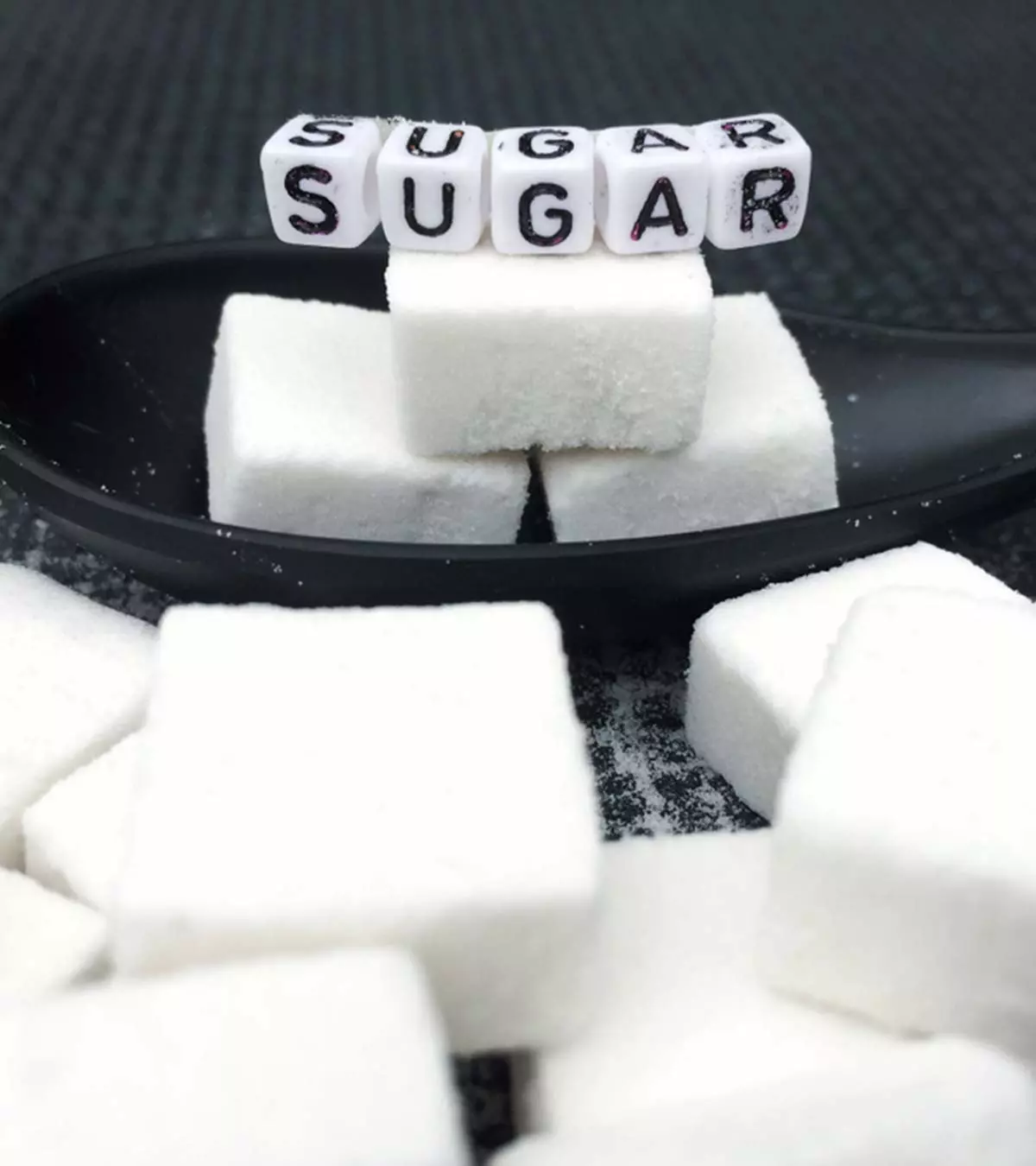
Image: Shutterstock
Sugar water for babies is often used for pain relief. It is prepared by dissolving regular sugar (sucroseiCrystalline disaccharide sugar, which is the main constituent of white sugar. or glucose) in water. The solution is commonly used in some cultures as a supplement with breast milk. However, it is not recommended to serve sugar water to babies, especially those younger than six months (1).
Read on to know the use of sugar water for babies and why it is not recommended.
Key Pointers
- Sugar water relieves pain, stomach issues, and jaundice in babies.
- However, it is not recommended for babies below six months of age.
- It may cause them to lose their appetite or develop a sweet tooth, eventually posing a risk for dental issues.
- Consult your child’s pediatrician for other remedies and learn the right amount of sugar water to administer to your baby.
Why Is Sugar Water Used For Babies?
There are several anecdotal and traditional uses of sugar water for babies. Some of the common ones are listed here.
- Aids in pain relief: In medical care, pharmaceutical-grade sugar water (or sweet sucrose water, as often called) is used to provide relief from pain. A research study showed that sterile sugar water could provide moderate pain relief caused by an intravenousiReferring to within or into the vein. procedure, such as the use of vaccine shots during routine immunization in neonatesiNewborns less than four weeks old. (2) (3).
Several other research studies documented the use of sugar water prior to surgeries or circumcision to provide pain relief to neonates and babies (4).
 Quick tip
Quick tip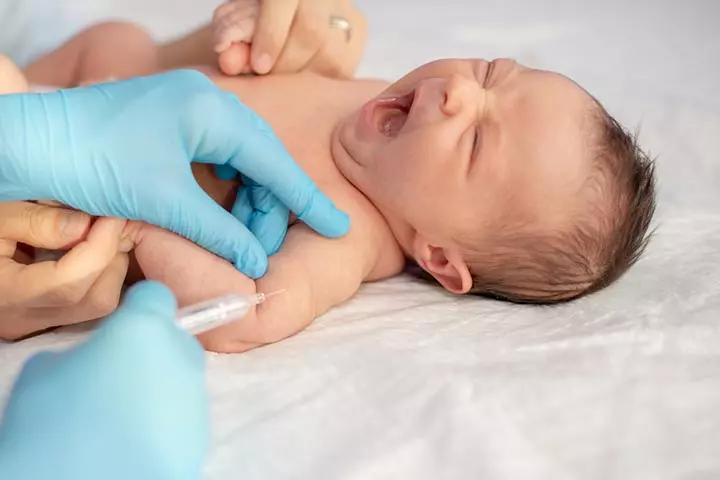
- Support upset stomach: Sugar water or glucose water is often used as a home remedy to provide necessary hydration to babies with an upset stomach. Parents use homemade ORS (oral rehydration solution) made up of warm water, white sugar, and common salt.
 Quick tip
Quick tipAccording to Dr. Bidisha Sarkar, “It is not recommended to use salt and sugar water for babies, as it may not have the right balance of electrolytes and glucose that they need. Therefore, the best ORS for babies is one that is commercially prepared and approved by the World Health Organization (WHO). You can get ORS packets from your doctor or pharmacist and mix them with clean water according to the instructions.”
- Might relieve constipation: Infant constipation is usually common in formula-fed babies and breastfed babies who are transitioning to solids. In both cases, sugar water is used as a traditional home remedy to relieve babies’ constipation. It is believed that sugar draws additional water into the small intestine and softens the stool. However, there are no clinical studies to support this belief. It is only a home remedy and constipated babies need to be consulted by a pediatrician.

- Is used for hiccups: In some cultures, sugar water is used to relieve hiccups in babies. However, clinical studies are sparse on this.
- Other purported uses: It was believed that sugar water could cure neonatal jaundice. However, on the contrary, research studies show that sugar water could be harmful in newborn jaundice (5). Doctors do not recommend sugar water to treat neonatal jaundice.
Sugar water is also considered a remedy for gas and coliciProlonged crying or fussiness in a baby. relief.
However, it is important for you to know that none of these uses are backed by scientific evidence.
How Is Sugar Water Given To Babies?

The use of sugar water to relieve pain after a medical procedure should be done under medical supervision. A doctor may administer either through a syringe into the baby’s mouth or by placing it on a pacifier. Let the pediatrician decide and, if necessary, give sugar water to your baby.
If you want to manage pain at home, then the pediatrician can recommend appropriate medications or pain management techniques. You may also try psychological pain reduction strategies like NNS (non-nutritive sucking), breastfeeding, and skin-to-skin contact.
Why Is Sugar Water Not Recommended For Babies?
The World Health Organization (WHO) recommends “no use of water” for babies under six months of age (6). For babies older than six months, water can be introduced in small quantities. However, the use of sugar water needs to be avoided due to the following reasons.
- Could suppress appetite: Sugar water prepared at home can be high in sugar, which can suppress appetite thus affecting infant nutrition and milk intake in exclusively breastfed infants (7) The same can be expected in formula-fed infants, where the frequency and duration of the baby feeding could come down.
- Can cause electrolyte imbalance: Ingestion of excess sugar water increases the risk of disturbing the electrolyteiMinerals present in blood and bodily fluids that carry an electric charge and are responsible for essential body functions. balance in the body. In severe cases, a baby may even experience water intoxication that can cause seizures.
- Baby might develop a preference for sweet foods: Generally, babies are born with a preference for sweet food. Regular intake of sugar water during their weaning phase may cause them to develop a preference for sweet foods. Besides, sugar water use does not serve any nutritional purpose.
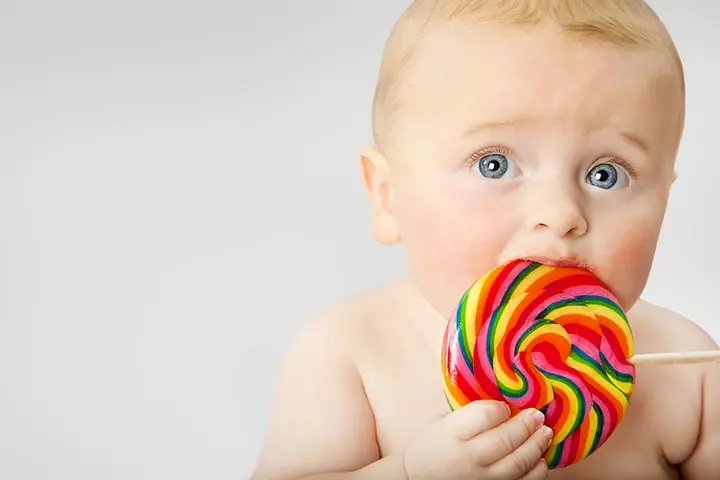
- Possible exposure to certain health risks: Consumption of excess sugar water can put a baby at an increased risk of excess weight gain, dental cavities, heart disease, diabetes, and fatty liver disease (8). This concern is crucial, especially in babies who are on infant formula, which may contain sugar in various forms, like corn syrup.
Excess sugar water intake may even cause an upset stomach and spit-up in babies.
If you intend to try sugar water for your baby older than six months, then you should do so after consulting a pediatrician.
How Is Sugar Water Prepared For Babies?
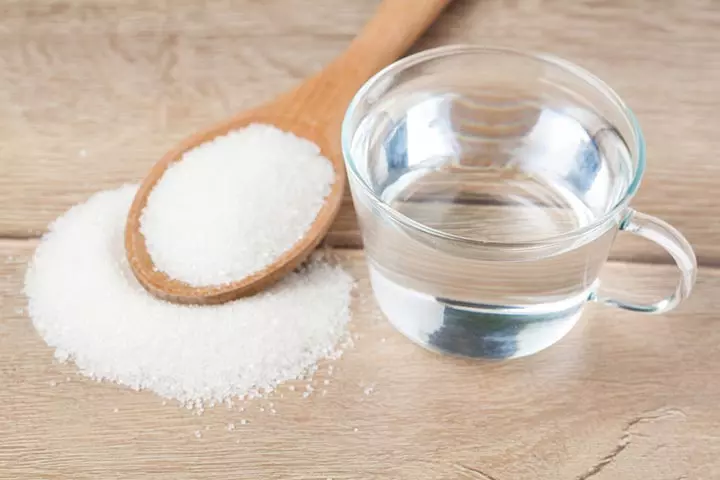
There is no standard recipe to prepare sugar water at home. Try to use as little sugar as possible. Here is one such recipe that you may try under pediatric guidance.
You will need:
- 1 cup plain water (boiled)
- 1tsp sugar
How to:
- Let the boiled water cool until it becomes slightly warm. Take a cup of water and add one teaspoon of sugar to it.
- Mix the sugar in water thoroughly. Ensure no granulesiSmall particles of a substance. are left as they could block the nipple of the bottle.
- Taste a drop of the mix. If you feel it is concentrated, then add additional water. However, do not add more than 10-20ml since excess water could dilute the solution.
Note: Avoid giving more than the recommended amount of sugar water to your baby. A concentrated sugar solution can have detrimental effects on an infant’s health, in the long run. Therefore, use it only when required.
Frequently Asked Questions
1. How much sugar water do I give to my baby?
Your pediatrician is the best person to decide whether you should give your baby sugar water and in what quantities.
2. Does sugar water make babies sleep?
Anecdotally, it is believed that sugar water can distract the baby from pain and may have a calming effect on them. However, there isn’t enough medical research to support the belief. It is suggested to refrain from using sugar water to make the babies fall asleep and try other natural methods.
3. Is sugar water a good source of energy for babies?
Sugar water can be considered a good source of energy for children due to sugar’s ability to cause a spike in the child’s energy levels. However, sugar water cannot be mixed with baby formula as they already contain added sweeteners and may not be useful as a replacement for formula or breast milk (11) (12).
4. Can sugar water be used to treat dehydration and fever in babies?
While sugar is a major ingredient in all store-bought oral rehydration solutions used to treat dehydration, it is best to consult a doctor before giving sugar water or ORS to the baby to determine how much of it is safe for the baby’s condition (13)
Using sugar water for babies to relieve pain, constipation, or other signs of infant discomfort is not advised unless recommended by the pediatrician. Administering too much sugar water at a young age increases the risks of electrolyte imbalance in the body. Also, it makes the baby prone to weight gain and related health issues. If your baby shows signs of colic, consult a healthcare provider or a pediatrician and ask for a safer alternative to sugar water.
Infographic: Reasons For Not Giving Sugar Water To Babies
Although sugar water has potential benefits for your baby, it is not highly recommended by doctors. But why? With the help of this infographic, we tell you a few probable reasons why you must avoid sugar water for babies unless suggested by the doctor. Read on and ensure that you keep this infographic handy for the times you need it the most. Illustration: Momjunction Design Team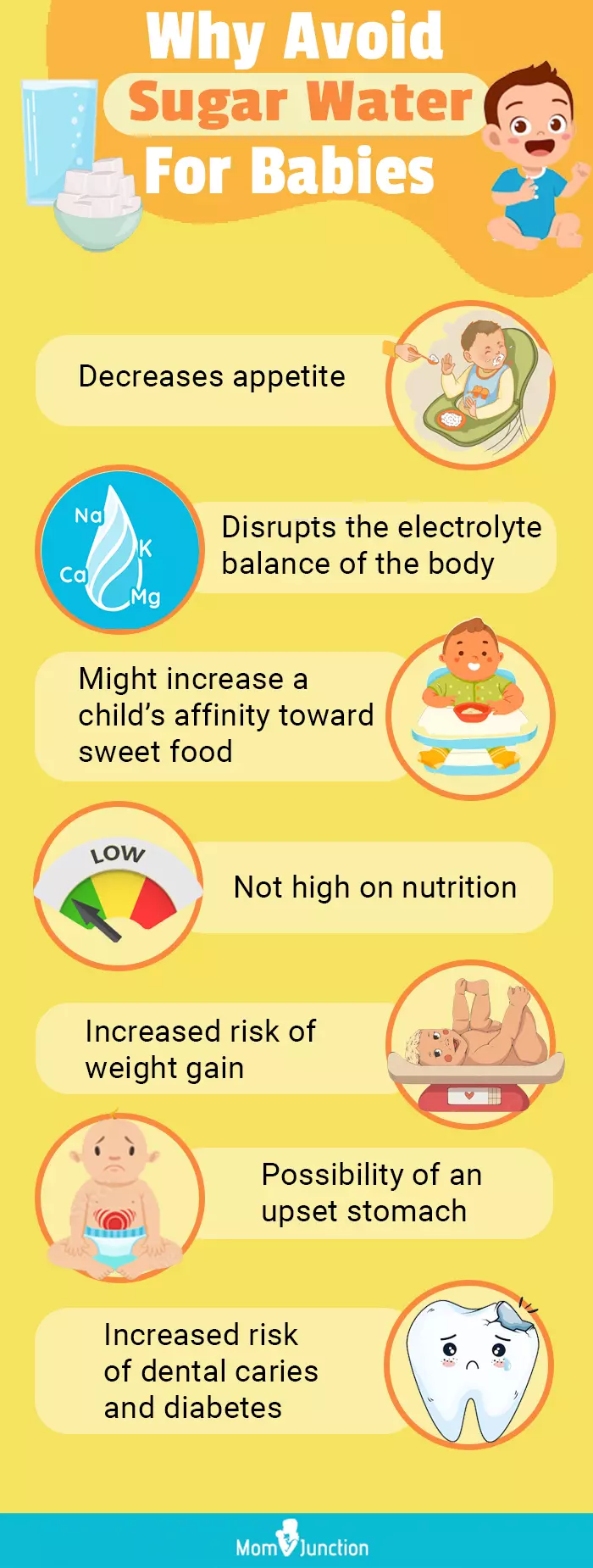
Illustration: Sugar Water For Babies: Safe Or Unsafe?

Image: Dalle E/MomJunction Design Team
References
1. Breastfeeding: Getting Started; Stanford Children’s Health
2. Anna Taddio et al.; Effectiveness of sucrose analgesia in newborns undergoing painful medical procedures; National Center For Biotechnology Information
3. Denise Harrison et al.; Efficacy of sweet solutions for analgesia in infants between 1 and 12 months of age: a systematic review; BMJ
4. Analgesic Properties of Oral Sucrose During Routine Immunizations; American Academy of Pediatrics
5. Breastfeeding And Jaundice; American Pregnancy Association
6. Infant and Young Child Feeding; WHO
7. Hasan Boskabadi and Sepideh Bagheri; Comparison between infants receiving traditional supplements (camel thorn, flix weed, and sugar water) and exclusively breast fed infants; National Center For Biotechnology Information
8. Recommended Drinks for Young Children Ages 0-5; Healthy Children; American Academy of Pediatrics
9. Reduce the Pain of Vaccination in Babies; Caring for Kids
10. Oral Rehydration Solutions: Made at Home; The Mother and Child Health and Education Trust
11. Kids are sweet enough without added sugar; Michigan State University Extension
12. Food as Medicine: Limiting Sugar in the Diet; The Children’s Hospital of Philadelphia
13. Dehydration: Giving Liquids at Home; Nationwide Children’s Hospital
Community Experiences
Join the conversation and become a part of our nurturing community! Share your stories, experiences, and insights to connect with fellow parents.
Read full bio of Dr. Abinaya Mathankumar
- Dr. Bidisha Sarkar is a pediatrician with nine years of experience. She did her graduation in Medicine from NRS Medical College, Kolkata and holds specialization in Pediatrics. Dr. Sarkar currently practices at KIMS Hospital in Hyderabad, India.
 Dr. Bidisha Sarkar is a pediatrician with nine years of experience. She did her graduation in Medicine from NRS Medical College, Kolkata and holds specialization in Pediatrics. Dr. Sarkar currently practices at KIMS Hospital in Hyderabad, India.
Dr. Bidisha Sarkar is a pediatrician with nine years of experience. She did her graduation in Medicine from NRS Medical College, Kolkata and holds specialization in Pediatrics. Dr. Sarkar currently practices at KIMS Hospital in Hyderabad, India.
Read full bio of Swati Patwal
Read full bio of Rohit Garoo
Read full bio of Ghazia Shah





